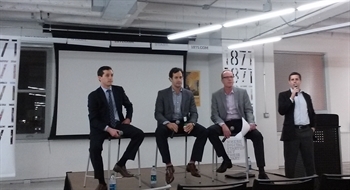Leveraging Economic Incentives for Start-ups: 1871 Panel
Laura Lane, PCI Chicagoland Director
Published: November 6, 2014
Last week, PCI Chicagoland Director Laura Lane attended the Leveraging Economic Incentives for Start-ups panel at 1871. Panelists included Adam Pollet, Director of Illinois Department of Commerce and Economic Opportunity, Bradley Serot of CB Richard Ellis, and Richard Klawiter of DLA Piper as facilitator. 
Key takeaways from the evening include:
Adam Pollet
Most industry development is organic and started by small business. Some of the tools for start-ups include capital access – tech transfer funds for proven commercial concepts and emerging technology grants. For research and development start-ups can look at Angel Tax credits for Angel investors.
Brad Serot
Brad advises tech companies (such as Uber, GoHealth, Groupon) where they should locate and when – a critical mass of employees and investment commitment usually will require a long term lease to demonstrate intent to keep jobs in the city/state.
Start-ups need lease flexibility and DCEO has tools that can help bridge the gap. Many of his clients grow “hocket stick” exponentially and he helps them find new space and the tools from the state/city and county to help bridge the gap between the new lease and their cash flow.
Life After 1871
Venture capitalists from other cities invest in these companies and pressure them to move to where they are; the state, city and county have to offer incentives for those companies to stay in Chicago.
Pollet on Governor Quinn’s vision for Illinois: The big-ticket idea for economic development is stability; Illinois is addressing the hard financial challenges and things are finally turning around (unemployment down 2.5% - best in the country, job growth, etc).
Serot on life after 1871: The flexible market for new start-ups is slim; subleases (usually most creative) are really slim; the majority of the available commercial space is new construction.
Fulton Market is the new hot spot – lots of tech firms and incubators are opening up there. This shows the tech sector impact on the local economy; River North and Fulton Market would not be hot spots but for the tech sector. Tech talent likes spaces where you can live/work/play.
Pollet
Density matters – attracting talent is important. Having an anchor tenant (in a building or a neighborhood) is key (Motorola in the Merchandise Mart).
DCEO has some creative partnerships with the community colleges and People’s Gas to train veterans for skilled positions.
The governor wants the tech sector to touch all of the neighborhoods of Chicago. He wants the entirety of the state to have access to those tech opportunities. The vision to do this includes:
- Co-working spaces like 1871 and the Chicago Innovation Exchange, but we have to move beyond place-based investments
- Bringing connectivity to neighborhoods
- Workforce training to bring skill sets to those communities (example – coding classes for teens)
Another tool (not grant) is the Advantage Illinois Program. These are low-interest loans (40 million fund) for all sorts of small businesses; tech and manufacturing can access this too. They leverage these funds for an additional 400 million invested in these small businesses.